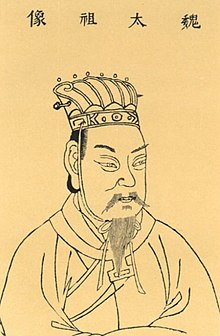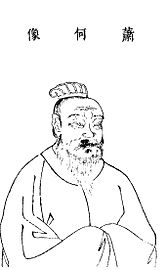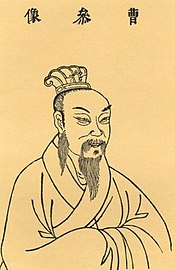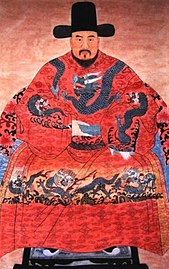Grand councilor

| Grand chancellor | |||||||||
|---|---|---|---|---|---|---|---|---|---|
| Chinese | 宰相 | ||||||||
| Literal meaning | overseeing minister | ||||||||
| |||||||||
| Alternative Chinese name | |||||||||
| Chinese | 丞相 | ||||||||
| |||||||||
| Second alternative Chinese name | |||||||||
| Traditional Chinese | 相國 | ||||||||
| Simplified Chinese | 相国 | ||||||||
| |||||||||
| Third alternative Chinese name | |||||||||
| Traditional Chinese | 宰輔 | ||||||||
| Simplified Chinese | 宰辅 | ||||||||
| |||||||||
| Fourth alternative Chinese name | |||||||||
| Chinese | 宰衡 | ||||||||
| |||||||||
| Fifth alternative Chinese name | |||||||||
| Traditional Chinese | 內閣總理大臣 | ||||||||
| Simplified Chinese | 内阁总理大臣 | ||||||||
| |||||||||
The grand chancellor (Chinese: 宰相; pinyin: Zǎixiàng, among other titles), also translated as counselor-in-chief, chancellor, chief councillor, chief minister, imperial chancellor, lieutenant chancellor and prime minister, was the highest-ranking executive official in the imperial Chinese government. The term was known by many different names throughout Chinese history, and the exact extent of the powers associated with the position fluctuated greatly, even during a particular dynasty.
Professor Zhu Zongbin of Peking University outlined the role of "grand chancellor" as one with the power to oversee all jurisdictional matters, the right to decide and to draft edicts with other ministers, and the position of chief advisor to the emperor. This extended even to the ability to criticize the emperor's edicts and decisions.[2][3] Thus, the grand chancellor served as the emperor's chief of staff and main political advisor, often exercising power second only to the emperor. In practice, the grand chancellor was often a trusted executive aide to the emperor, but during political turmoil or power struggles between the two roles the grand chancellor could also be the emperor's primary political competitor and opponent.[4]
This balance of power means that the relation between grand chancellor (and the scholar-officials they represent) and emperor holds great significance in the Confucian thought of governance and the relation of "lord and subject" (君臣).[5][6]
"Grand chancellor" can denote several positions. During the Six Dynasties period, the term denoted a number of power-holders serving as chief administrators, including zhongshun jian (Inspector General of the Secretariat), zhongshu ling (President of the Secretariat), shizhong (Palace Attendant), shangshu ling and puye (president and vice-president of the Department of State Affairs).[7]
History
In the Spring and Autumn period, Guan Zhong was the first chancellor in China,[8] who became chancellor under the state of Qi in 685 BCE. In Qin, during the Warring States period, the chancellor was officially established as "the head of all civil service officials." There were sometimes two chancellors, differentiated as being "of the left" (senior) and "of the right" (junior). After emperor Qin Shi Huang ended the Warring States period by establishing the Qin dynasty (221–206 BC), the chancellor, together with the imperial secretary, and the grand commandant, were the most important officials in the imperial government, generally referred as the Three Lords.[9][10]
In 1 BC, during the reign of Emperor Ai, the title was changed to da si tu (大司徒).[11] In the Eastern Han dynasty, the chancellor post was replaced by the Three Excellencies: Grand Commandant (太尉), Minister over the Masses (司徒) and Minister of Works (司空).[12] In 190, Dong Zhuo claimed the title "Chancellor of State" (相國) under the powerless Emperor Xian of Han,[13] placing himself above the Three Excellencies. After Dong Zhuo's death in 192, the post was vacant until Cao Cao restored the position as "imperial chancellor" (丞相) and abolished the Three Excellencies in 208.[14] From then until March 15, 220, the power of chancellor was greater than that of the emperor. Later this often happened when a dynasty became weak, usually some decades before the fall of a dynasty.
During the Sui dynasty, the executive officials of the three highest departments of the empire were called "chancellors" (真宰相) together.[15] In the Tang dynasty, the government was divided into three departments: the Department of State Affairs (尚書省), the Secretariat (中書省), and the Chancellery (門下省). The head of each department was generally referred to as the chancellor.[16]
In the Song dynasty, the post of chancellor was also known as the "Tongpingzhangshi" (同平章事),[17] in accordance with late-Tang terminology, while the vice-chancellor was known as the jijunsi. Some years later, the post of chancellor was changed to "prime minister" (首相 shou xiang) and the post of vice-chancellor was changed to "second minister" (次相 ci xiang).[18] In the late Southern Song dynasty, the system changed back to the Tang naming conventions.
During the Mongol-founded Yuan dynasty, the chancellor was not the head of the Secretariat, but the Crown Prince (皇太子) was. After the establishment of the Ming dynasty, the post became the head of the Zhongshu Sheng again. The post was abolished after the execution of Hu Weiyong, who was accused of treason (though his conviction is still strongly disputed in present times because of a lack of evidence to prove his guilt).[19] Still, appointments of the people who held the highest post in the government were called "appointment of prime minister" (拜相) until 1644.
Influence
During and after the Mongol-led Yuan dynasty, the Mongols continued the use of a title Chingsang, from Chengxiang (丞相) for various high leaders, such as Pulad, the Yuan ambassador to the Ilkhan[20] and for the deputy of the Western Mongol leader, the taishi.[21] The title was also used in the Ilkhanate, for the vizier Buqa.[22]
List of chancellors of China
List of chancellors of Shang dynasty
| Name | |
|---|---|
| Pinyin (romanization) | Chinese characters |
| Yi Yin | 伊尹 |
| Zhong Hui | 仲虺 |
| Yi Zhi | 伊陟 |
| Wu Xian | 巫咸 |
| Wu Xian | 巫賢 |
| Gan Xuan | 甘盤 |
| Fu Yue | 傅說 |
| Ji Zi | 箕子 |
Zhou dynasty
- Jiang Ziya
- Duke of Zhou
- Duke Huan of Zheng
- Duke Zhuang of Zheng
- Guan Zhong of Qi state (died in 645 BC)
- Bao Shuya of Qi state
- Yan Ying of Qi state
- Fan Li of Qi State and Yue state
- Wu Zixu of Wu state
- Bo Pi of Wu state
- Cheng Dechen of Chu state
- Sunshu Ao of Chu state
- Wu Qi of Chu state
- Lord Chunshen of Chu state
- Lord Mengchang of Qi state
- Tian Dan of Qi state
- Li Kui of Wei state
- Hui Shi of Wei State
- Lin Xiangru of Zhao state
- Li Mu of Zhao state
- Su Qin of Yan state
- Yue Yi of Yan state
- Baili Xi of Qin state
- Shang Yang of Qin State
- Zhang Yi of Qin State
Qin dynasty
- Fan Ju
- Lü Buwei (251–238 BCE in office)
- Lord Changping
- Kui Zhuang
- Wang Guan
- Li Si (?–208 BCE in office)
- Feng Quji
- Zhao Gao (208–207 BCE in office)
Han dynasty

- Xiao He (206–193 BCE in office); Chen Xi (197 BCE), over Zhao
- Cao Shen (193–190 BCE in office)
- Chen Ping (190–179 BCE in office)
- Zhou Bo
- Guan Ying
- Zhou Yafu
- Huo Guang
- Shi Dan 史丹 (see Emperor Yuan of Han)
- Wang Mang
- Liu Yan (Bosheng)
- Deng Yu (25–27 in office)
- Wu Han
- Yuan An
- Dou Xian
- Li Gu
- Liang Ji
- Dou Wu
- Chen Fan
- Qiao Xuan
- Cao Song
- Zhang Wen
- Liu Yu
- Dong Zhuo
- He Jin
- Wang Yun
- Ma Midi
- Xun Shuang
- Huangfu Song
- Zhu Jun
- Cao Cao (196-220 in office)
- Cao Pi
Three Kingdoms
- Sun Shao (221–225)
- Gu Yong (225–243)
- Lu Xun (244–245)
- Bu Zhi (246–247)
- Zhu Ju (249–250)
- Sun Jun (253–256)
- Sun Chen (258)
- Puyang Xing (262–264)
- Zhang Ti (279–280)
- Jia Xu
- Hua Xin
- Zhong Yao
- Wang Lang
- Chen Qun
- Dong Zhao
- Cui Lin
- Man Chong
- Jiang Ji
- Cao Shuang
- Sima Yi
- Gao Rou
- Wang Ling
- Zhuge Dan
- Sun Li
- Sima Shi
- Sima Zhao
- Sima Fu
- Wang Chang
- Wang Guan
- Deng Ai
- Zhong Hui
- Sima Yan
- Wang Xiang
- Sima Wang
Sui dynasty
- Gao Jiong
- Li Shimin
- Li Delin
- Su Wei
- Yang Su
- Yang Guang
- Yang Xiu
- Yang Zhao
- Yang Jian
- Xiao Cong
- Yuwen Shu
- Yu Shiji
- Li Yuan
- Yuwen Huaji
- Wang Shichong
- Li Mi
Tang dynasty
- Li Shimin (618–626 in office) (later Emperor Taizong of Tang)
- Fang Xuanling (626–648 in office)
- Wei Zheng (629–643 in office)
- Cen Wenben (unknown, under Emperor Taizong of Tang)
- Cen Changqian (unknown, under Emperor Gaozong of Tang)
- Cen Xi (unknown, under Emperor Shang of Tang, Emperor Ruizong of Tang and Emperor Xuanzong of Tang)
- Fan Lübing (686–688 in office)
- Di Renjie (691–693, 697–700 in office)
- Yao Chong (698–705, 710–711, 713–716 in office)
- Zhang Jiuling (733–736 in office)
- Li Linfu (734–752 in office)
- Yang Guozhong (752–756 in office)
- Wang Wei (758–759 in office)
- Li Deyu (833–835, 840–846 in office)
Song dynasty
Northern Song
- Fan Zhi (960–964 in office)
- Zhao Pu (964–973, 981–983, 988–992 in office)
- Kou Zhun (1004–1006, 1017–1021 in office)
- Wang Qinruo (1017–1019, 1023–1024 in office)
- Wang Zeng (1022–1029, 1035–1037 in office)
- Fan Zhongyan (1040–1045 in office)
- Wang Anshi (1067-1075, 1076–1077 in office)
- Sima Guang (1085–1086 in office)
- Fan Chunren (1086– in office)
- Fan Chunli (– in office)
- Zhang Dun (1094–1100 in office)
- Cai Jing (1101–1125 in office)
Southern Song
- Li Gang (1127 in office)
- Zhang Jun (1135–1137 in office)
- Qin Hui (1131–1132, 1137–1155 in office)
- Han Tuozhou (1194–1207 in office)
- Shi Miyuan/Shih Mi-yüan (1207–1233 in office).
- Jia Sidao (1259–1275 in office)
- Chen Yizhong (1275–1276 in office)
- Wen Tianxiang (1275–1278 in office)
- Lu Xiufu (1278–1279 in office)
Ming dynasty
Note: after the death of Hu Weiyong, the title of grand chancellor was abolished. The office of the Grand Secretariat assumed the de facto powers of the chancellery after the reign of the Hongwu Emperor.
- Li Shanchang (1368–1376)
- Hu Weiyong (1376–1380) – The last chancellor of China
- Yang Siqi
- Yan Song (in office 1544–1545)
- Xia Yan (in office 1546–1547)
- Yan Song (2nd time in office 1548–1562)
- Xu Jie
- Gao Gong
- Zhang Juzheng (in office 1572–1582)
- Zhang Siwei
- Shen Shixing
- Wang Jiabing
- Zhao Zhigao
- Wang Xijue
- Zhao Zhigao
Qing dynasty
The Qing dynasty bureaucratic hierarchy did not contain a chancellor position. Instead, the duties normally assumed by a chancellor were entrusted to a series of formal and informal institutions, the most prominent of which was the Grand Council. Occasionally, one minister may held enough power in the government that he comes to be identified, figuratively, as the "chancellor".
In 1911, the Qing court adopted reforms which, amongst other changes, established the position of prime minister. This position existed for less than a year before the Qing government was overthrown.
Premiers after 1911
Gallery
-
Xiao He, chancellor of the Han dynasty
-
Cao Shen, chancellor of the Han dynasty
-
Chen Ping, chancellor of the Han dynasty
-
Huo Guang, chancellor of the Han dynasty
-
Zhuge Liang (181–234), chancellor of the Shu Han (221–234)
-
Yang Su, chancellor of the Sui dynasty
-
Zhangsun Wuji, chancellor of the Tang dynasty
-
Fang Xuanling (579–648), chancellor of the Tang dynasty (626–648)
-
Du Ruhui, chancellor of the Tang dynasty (628–629)
-
Wei Zheng, chancellor of the Tang dynasty (629–643)
-
Di Renjie, chancellor of the Tang dynasty (691–693, 697–700)
-
Han Huang (723–787), Song dynasty painting
-
Li Deyu, chancellor of the Tang dynasty (833–835, 840–846)
-
Zhao Pu, chancellor of the Song dynasty (964–973, 981–983, 988–992)
-
Kou Zhun, chancellor of the Song dynasty (1004–1006, 1017–1021)
-
Wang Anshi, chancellor of the Song dynasty (1067–1075, 1076–1077)
-
Sima Guang, chancellor of the Song dynasty (1085–1086)
-
Qin Hui, chancellor of the Song dynasty (1131–1132, 1137–1155)
-
Shi Miyuan chancellor of the Song dynasty (1207–1233)
-
Wen Tianxiang chancellor of the Song dynasty (1275–1278)
-
Lu Xiufu chancellor of the Song dynasty (1278–1279)
-
Yan Song, Grand Secretary of the Ming dynasty
-
Gao Gong, Grand Secretary of the Ming dynasty
-
Zhang Juzheng, Grand Secretary of the Ming dynasty (1572–1582)
See also
- Chancellor of the Tang dynasty
- Prime Minister of the Imperial Cabinet
- Menxia Sheng
- List of premiers of China
- Imperial examination
- Chinese law
- Shumishi
References
Citations
- ^ "魚水君臣 ("Fish (and) water lord (and) subject") refers to the term "君臣魚水" from Records of the Three Kingdoms, where Liu Bei refers to gaining Zhuge Liang's service as if "a fish gaining water"
- ^ 祝总斌 (1990). 两汉魏晋南北朝宰相制度研究. 北京市: 中国社会科学出版社. pp. 1–14. ISBN 7-5004-0700-9.
- ^ Theobald, Ulrich. "chengxiang 丞相, Counsellor-in-chief". chinaknowledge.de.
- ^ 陈克礼. "中国古代宰相制度的演变". guoxue.com. 温州大学人文学院2002级汉语言文学专业. Retrieved 13 October 2023.
- ^ Yü, Ying-shih (2021). "Confucian Culture vs. Dynastic Power in Chinese History". Asia Major. 34 (1–2).
- ^ Gardner, Daniel K. (26 June 2014). Confucianism: A Very Short Introduction. Oxford University Press. pp. 33–44, 54–58, 98–100. ISBN 9780190236809.
- ^ Cunrui Xiong, Victor (2017). Historical Dictionary of Medieval China. Rowman & Littlefield Publishers. p. 100. ISBN 9781442276161.
- ^ (in Chinese) Guan Zhong Memorial Opened in Linzi Archived 2016-03-03 at the Wayback Machine, Xinhuanet, September 19, 2004.
- ^ Royal Asiatic Society of Great Britain and Ireland. North-China Branch (1876). Journal of the North-China Branch of the Royal Asiatic Society, Volume 10. SHANGHAI: The Branch. p. 85. Retrieved June 28, 2011.
- ^ Li (2007), 75.
- ^ Wang (1949), 144.
- ^ (in Chinese) Chancellor of China, Sina.com.
- ^ Book of the Later Han Vol.72; Records of Three Kingdoms Vol. 6.
- ^ Records of Three Kingdoms Vol. 1.
- ^ (in Chinese) The History of the Chancellor System in China Archived 2011-07-07 at the Wayback Machine.
- ^ (in Chinese) Tong Zhongshu Menxia Pingzhangshi[permanent dead link], Encyclopedia of China.
- ^ (in Chinese) "Chancellor in the Song Dynasty"
- ^ (in Chinese) The Change of Central Administration in Tang and Song Dynasties Archived 2005-04-25 at the Wayback Machine.
- ^ (in Chinese) The History of Chancellor of China Archived 2007-08-11 at archive.today, QQ.com.
- ^ Paul D. Buell; Francesca Fiaschetti (2018). Historical Dictionary of the Mongol World Empire. Rowman & Littlefield. p. 131. ISBN 9781538111376.
- ^ Charles Bawden (2013). Mongolian English Dictionary. Routledge. ISBN 9781136155956.
- ^ Michael Hope (2016). Power, Politics, and Tradition in the Mongol Empire and the Īlkhānate of Iran. Oxford University Press. p. 136. ISBN 9780198768593.
Sources
 This article incorporates text from Journal of the North-China Branch of the Royal Asiatic Society, Volume 10, by Royal Asiatic Society of Great Britain and Ireland. North-China Branch, a publication from 1876, now in the public domain in the United States.
This article incorporates text from Journal of the North-China Branch of the Royal Asiatic Society, Volume 10, by Royal Asiatic Society of Great Britain and Ireland. North-China Branch, a publication from 1876, now in the public domain in the United States.- Li, Konghuai (2007). History of Administrative Systems in Ancient China (in Chinese). Joint Publishing (H.K.) Co., Ltd. ISBN 978-962-04-2654-4.
- Wang, Yü-Ch'üan (June 1949). "An Outline of The Central Government of The Former Han Dynasty". Harvard Journal of Asiatic Studies. 12 (1/2): 134–187. doi:10.2307/2718206. JSTOR 2718206.
External links
 Media related to Chancellors (government) at Wikimedia Commons
Media related to Chancellors (government) at Wikimedia Commons
























